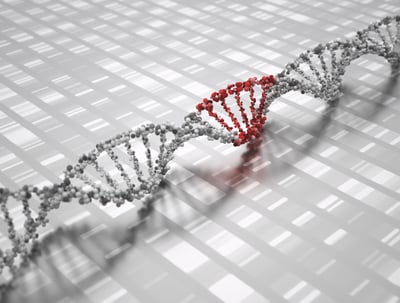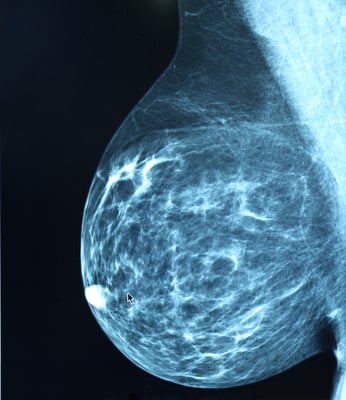FORCE's eXamining the Relevance of Articles for You (XRAY) program looks behind the headlines of cancer news to help you understand what the research means for you.
XRAY is a reliable source of hereditary cancer research-related news and information.
Learn more about the XRAY program
Hereditary Cancer
Relevance: High


Strength of Science: High


Research Timeline: Post Approval


Study : Disparities in research impact breast screening guidelines
Relevance: High


Strength of Science: High


Research Timeline: Post Approval


Most relevant for: Women at average risk for breast cancer
For women at average risk of breast cancer, the United States Preventive Services Task Force (USPSTF) currently recommends beginning annual breast cancer screening at age 50. However, because these guidelines are largely based on data from white women, they may not be sensitive to racial differences. A new study assesses the age distribution of breast cancer cases across race/ethnicity in the U.S. (6/21/18)
Read More
Relevance: Medium-High


Strength of Science: Medium-High


Research Timeline: Human Research


Study : Mutations in Lynch syndrome genes MSH6 and PMS2 may be associated with breast cancer
Relevance: Medium-High


Strength of Science: Medium-High


Research Timeline: Human Research


Most relevant for: Women with an MSH6 or PMS2 mutation
Some women with mutations in MSH6 and PMS2, two Lynch syndrome genes, may have a modest (2 to 3-fold) increased risk for breast cancer. (6/14/18 updated 09/25/19)
Read More
Relevance: High


Quality of Writing: Medium-High


Personal Story : Juliet's story: No reconstruction is a post-mastectomy option
Most relevant for: Women who have had or are considering mastectomy without reconstruction
In a March 2018 article from breastcancercare.org, Juliet conveys her personal experience with a breast cancer diagnosis and her decision to not have her breasts reconstructed after her mastectomy. She details the emotional complexity of her thought process and the empowerment she felt in her decisions. (5/24/18)
Read More
Relevance: High


Quality of Writing: High


Article : The right not to know when not knowing is dangerous
Most relevant for: People with Icelandic heritage
Healthcare providers are bound by the guiding principle of doing no harm. But how does this concept apply to their patients who have not consented to genetic testing or who do not want to know their results? In that case, is providing test results more harmful or not? Anna Clausen explores these issues in the context of breast cancer gene testing in her Global Health Now article “The Right Not to Know: When Ignorance is Bliss but Deadly.” (4/20/18)
Read More
Relevance: Medium-High


Strength of Science: Medium


Study : Take your time, follow your heart: strategies for communication about family planning
Relevance: Medium-High


Strength of Science: Medium


Most relevant for: Young high risk women
When a woman is newly diagnosed with a BRCA mutation, she faces many risk management decisions. Although many of these decisions impact family planning, little guidance is available on how to communicate this information. This study examines female previvors’ advice on effective strategies for discussing family planning decisions. (03/28/18)
Read More
Relevance: Medium


Research Timeline: Post Approval


Update : FDA approves at-home test kits for inherited cancer: how useful are they?
Most relevant for: People who are considering or have had direct-to-consumer testing through 23andMe
Genetic testing for health conditions (such as risk for cancer) typically requires a prescription from a doctor. Until recently, direct-to-consumer (DTC) genetic testing has focused on tests to learn your ancestry and find of unknown branches of family trees. A laboratory called 23andMe that provides direct-to-consumer genetic testing has been given FDA approval to report results for 3 mutations found in the BRCA1 and BRCA2 genes. The FDA statement provides details about this approval and warns people about the limitations of the 23andMe test. (03/19/18)
Read More
Relevance: Medium-High


Quality of Writing: Medium


Article : Insurance companies are more than curious about your genetic test results
Relevance: Medium-High


Quality of Writing: Medium


Most relevant for: People considering testing for an inherited gene mutation
An article on CBSNews.com addressed why insurance companies, particularly long-term insurance companies, might want to know which of their policy holders and potential policy holders have a gene that raises their risk for cancer. The article discusses genetic discrimination by insurance companies that provide long term care policies. Federal laws protect people with gene mutations from discrimination in health insurance. No such federal laws exist for life insurance, disability insurance or long term care. (3/13/18)
Read More
Relevance: High


Strength of Science: High


Research Timeline: Post Approval


Study : Should biannual MRIs replace annual mammograms in high-risk women?
Relevance: High


Strength of Science: High


Research Timeline: Post Approval


Most relevant for: Women at increased risk for breast cancer due to an inherited mutation
The risk of breast cancer is exceptionally high in women who have a personal or family history of breast cancer or who carry a mutation in BRCA or certain other genes. More frequent screening is one strategy for early detection of breast cancer for these women. Study results presented at the 2017 San Antonio Breast Cancer Symposium suggest that MRI screening every 6 months may be more effective than the currently recommended annual breast MRI and annual mammogram in detecting early stage breast cancers-which are more treatable-in high-risk women. (2/1/18)
Read More
Relevance: Medium-Low


Strength of Science: Medium-Low


Research Timeline: Human Research


Study : No new high-risk breast cancer genes here
Relevance: Medium-Low


Strength of Science: Medium-Low


Research Timeline: Human Research


Most relevant for: People with a family history of breast cancer but no known inherited mutation
While some of the genes that cause hereditary breast cancer are known (for example, inherited mutations in genes like BRCA, ATM and PALB2), others remain unidentified. Two studies found 72 DNA changes (also known as “variants” or “SNPs”) that affect breast cancer risk. These variants are different from mutations in genes that dramatically increase cancer risk. Most of these new variants are located outside of the portion of DNA that is used to make proteins. Further research is needed on these new variants before they can be used by doctors to help people understand and manage their risk for cancer. (1/12/18)
Read More
Relevance: High


Strength of Science: Medium-High


Study : Birth control and breast cancer risk among younger women
Relevance: High


Strength of Science: Medium-High


Most relevant for: Young women on, or considering taking hormonal birth control
On December 7, 2017 the New England Journal of Medicine published results from a study by Lina Mørrch of the University of Copenhagen and colleagues showing that hormonal contraceptives (birth control) increase the risk of breast cancer. The study is unique because it is one of the first to specifically assess the breast cancer risk associated with newer, low-dosage methods of contraception. The large and significant effort analyzed medical data of nearly 1.8 million young women in Denmark on average for over 10.9 years. Results were covered widely in the U.S. by many major media outlets, including the New York Times, USA Today, Forbes and Time. (12/14/17)
Read More